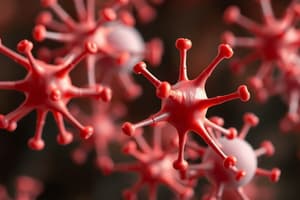Podcast
Questions and Answers
What is the main effect of cholinergic drugs?
What is the main effect of cholinergic drugs?
- Block the parasympathetic nervous system
- Cause increased heart rate
- Stimulate the parasympathetic nervous system (correct)
- Decrease muscle rigidity
What is a potential adverse effect of anticholinergic drugs?
What is a potential adverse effect of anticholinergic drugs?
- Decreased sweating (correct)
- Increased urinary output
- Stimulation of the sympathetic nervous system
- Constriction of the internal sphincter
When should patients taking anticholinergic drugs contact their doctor?
When should patients taking anticholinergic drugs contact their doctor?
- If they experience increased pooping
- If they have dilated pupils
- If they feel drowsy
- If they have muscle cramps (correct)
What is the antidote to anticholinergic drugs?
What is the antidote to anticholinergic drugs?
What effect do anticholinergic drugs have on heart rate?
What effect do anticholinergic drugs have on heart rate?
Which condition would be a contraindication for taking anticholinergic drugs?
Which condition would be a contraindication for taking anticholinergic drugs?
What is the potential consequence of giving anticholinergic drugs to patients with glaucoma?
What is the potential consequence of giving anticholinergic drugs to patients with glaucoma?
What is the role of atropine among anticholinergic drugs?
What is the role of atropine among anticholinergic drugs?
What is the main effect of anticholinergic drugs?
What is the main effect of anticholinergic drugs?
For which condition is the anticholinergic medication Dicyclomine/Bentyl commonly used?
For which condition is the anticholinergic medication Dicyclomine/Bentyl commonly used?
What is the antidote for atropine, an anticholinergic drug?
What is the antidote for atropine, an anticholinergic drug?
What is a potential adverse effect of anticholinergic drugs?
What is a potential adverse effect of anticholinergic drugs?
What is the primary effect of anticholinergic drugs?
What is the primary effect of anticholinergic drugs?
Which medication is commonly used for overactive bladder among anticholinergic drugs?
Which medication is commonly used for overactive bladder among anticholinergic drugs?
In what condition would anticholinergic drugs be given in the hospital before surgery?
In what condition would anticholinergic drugs be given in the hospital before surgery?
What is the primary role of Glycopyrrolate/Robinul, an anticholinergic drug?
What is the primary role of Glycopyrrolate/Robinul, an anticholinergic drug?
Which condition can be treated using Scopolamine, an anticholinergic medication?
Which condition can be treated using Scopolamine, an anticholinergic medication?
How do anticholinergic drugs affect the parasympathetic nervous system?
How do anticholinergic drugs affect the parasympathetic nervous system?
What is the potential risk for patients taking anticholinergic drugs?
What is the potential risk for patients taking anticholinergic drugs?
What is the effect of anticholinergic drugs on the internal sphincter?
What is the effect of anticholinergic drugs on the internal sphincter?
Which of the following conditions can be treated using anticholinergic medications?
Which of the following conditions can be treated using anticholinergic medications?
What is a potential use of anticholinergic drugs?
What is a potential use of anticholinergic drugs?
What is a potential condition for which anticholinergic drugs might not be suitable?
What is a potential condition for which anticholinergic drugs might not be suitable?
Anti-Cholinergic drugs dry you out.
Anti-Cholinergic drugs dry you out.
Before an operation, what anticholinergic drug would you see given to a patient?
Before an operation, what anticholinergic drug would you see given to a patient?
Flashcards are hidden until you start studying
Study Notes
Cholinergic and Anticholinergic Drugs Overview
- Cholinergic drugs primarily enhance the actions of acetylcholine, impacting various body systems.
- Anticholinergic drugs inhibit acetylcholine's effects to reduce bodily secretions and muscle contractions.
Adverse Effects
- A potential adverse effect of anticholinergic drugs includes dry mouth, constipation, blurred vision, and urinary retention.
- Patients taking anticholinergic drugs should contact their doctor if experiencing severe side effects like confusion, hallucinations, or signs of an allergic reaction.
Antidotes and Interactions
- The antidote for anticholinergic drug toxicity is typically Physostigmine.
- Atropine, a common anticholinergic, is used to treat bradycardia and to reduce salivary and bronchial secretions during surgery.
- Glycopyrrolate/Robinul is administered preoperatively to decrease secretions.
Effects on Body Systems
- Anticholinergic drugs increase heart rate by blocking the vagus nerve’s influence on the heart.
- They can worsen conditions such as glaucoma due to increased intraocular pressure.
Contraindications and Conditions Treated
- Contraindications for anticholinergic drugs include glaucoma, myasthenia gravis, and certain urinary retention issues.
- Anticholinergic medications, including Dicyclomine/Bentyl, are used for functional bowel syndrome and related gastrointestinal issues.
- Scopolamine is often used to prevent motion sickness.
Risks and Considerations
- A potential risk for patients on anticholinergic drugs includes increased risk of dementia with long-term use.
- Anticholinergic drugs may lead to urinary retention by causing contraction of the internal sphincter.
Therapeutic Uses
- Anticholinergics are useful for treating conditions such as overactive bladder, chronic obstructive pulmonary disease (COPD), and preoperative sedation.
- They dry out secretions and are frequently used in surgical settings to facilitate procedures.
Studying That Suits You
Use AI to generate personalized quizzes and flashcards to suit your learning preferences.




